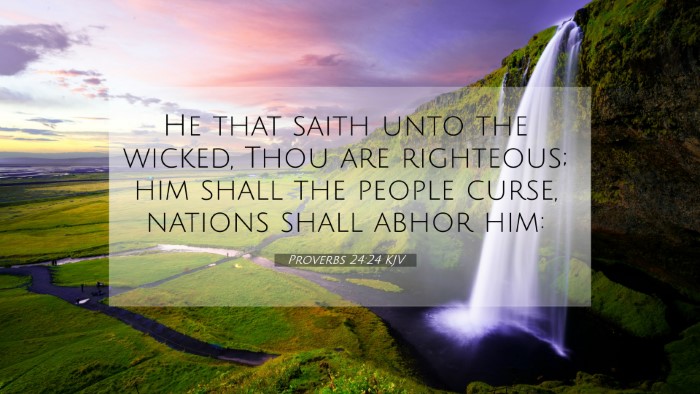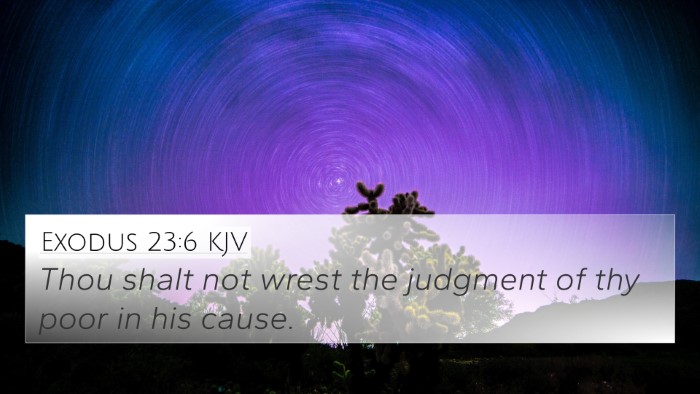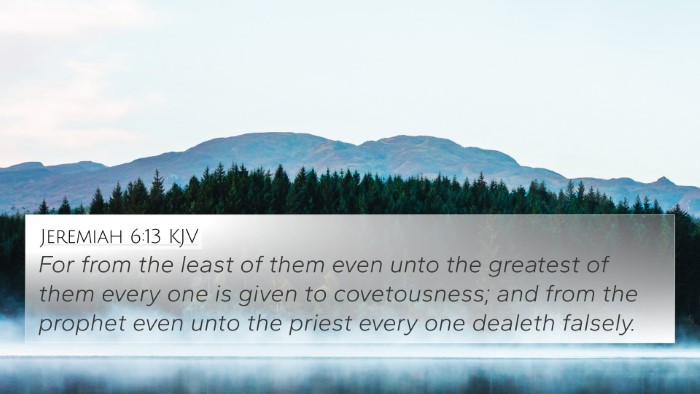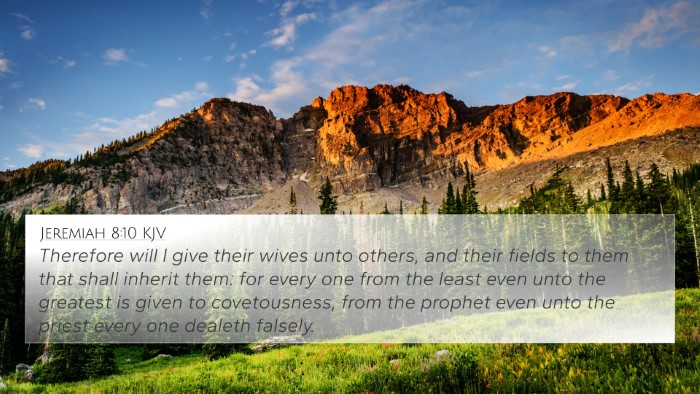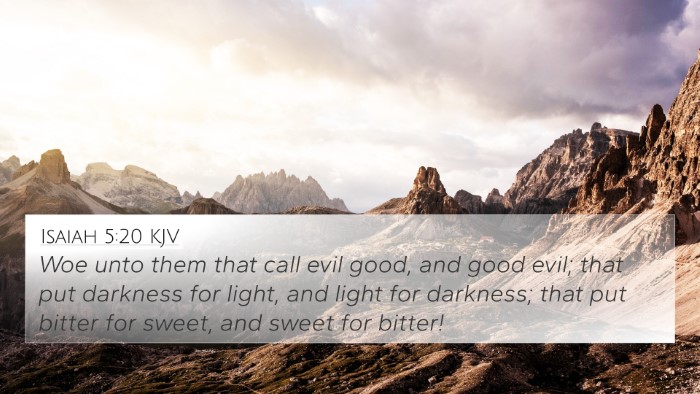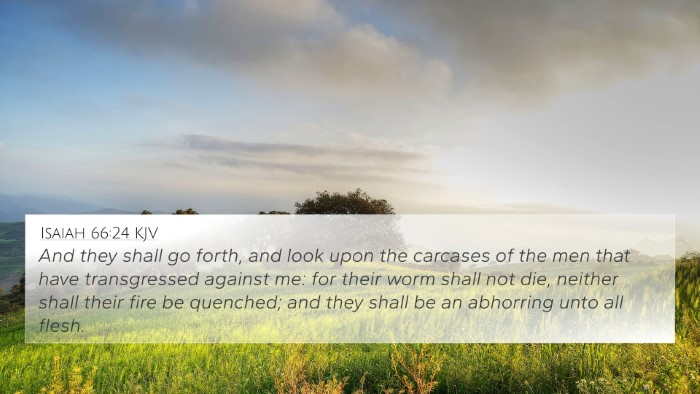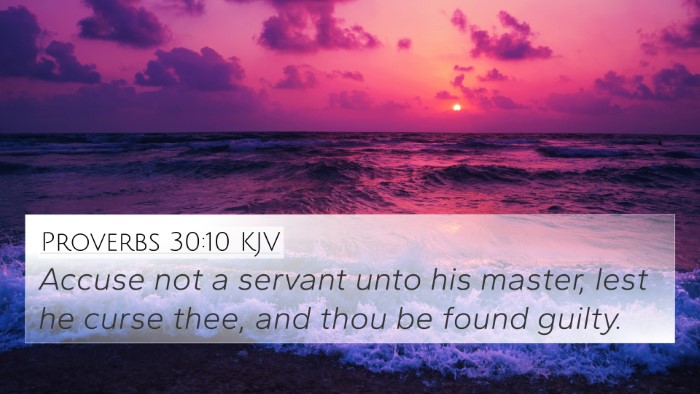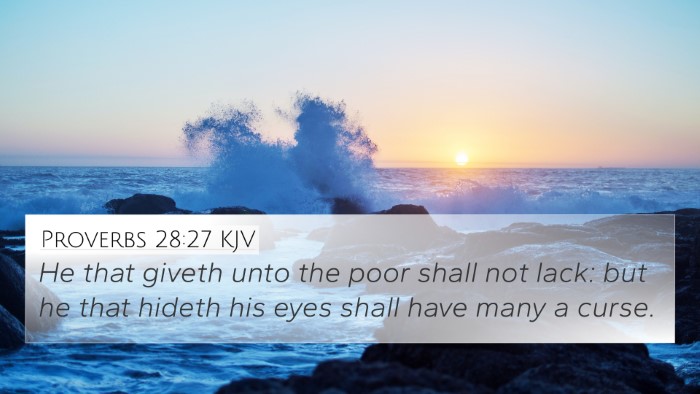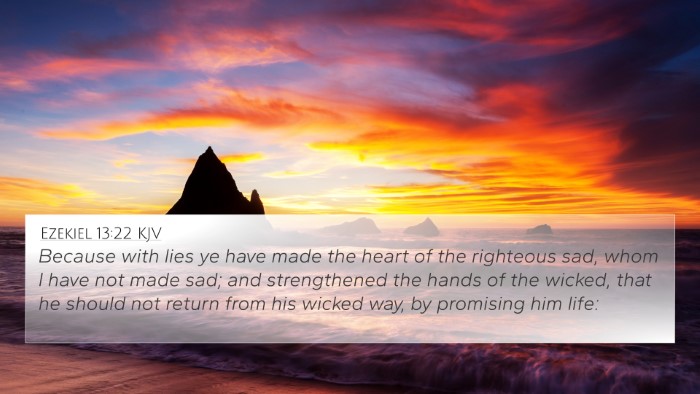Understanding Proverbs 24:24
Proverbs 24:24 states: “He that saith unto the wicked, Thou art righteous; him shall the people curse, nations shall abhor him.” This verse offers profound insights regarding justice, morality, and the societal consequences of falsehood.
Summary of Meaning
The verse conveys a stark warning against endorsing wickedness under the guise of righteousness. It emphasizes that those who falsely proclaim the wicked as just will face widespread condemnation and scorn.
Insights from Commentaries
-
Matthew Henry: Matthew Henry articulates that this verse is a condemnation of those in positions of authority who manipulate the truth for personal gain. He underlines that societal respect and national integrity are compromised when leaders fail to uphold justice.
-
Albert Barnes: Albert Barnes notes that the act of declaring the wicked righteous will inevitably lead to societal judgment and disdain. He emphasizes that true righteousness demands discernment and courage to stand against sin.
-
Adam Clarke: Adam Clarke adds that this proverb serves as a social admonition. He interprets the ‘people’ and ‘nations’ as representing the collective moral compass of society which reacts negatively to deceit and injustice.
Thematic Bible Verse Connections
Proverbs 24:24 beautifully connects with various other scriptures, enhancing its meaning through comparative verse analysis. These connections can create a deeper understanding of Biblical themes surrounding morality, truth, and justice. Here are several Bible verse cross-references:
- Proverbs 17:15: "He who justifies the wicked; and he who condemns the just, are both alike an abomination to the Lord." This verse parallels the condemnation of falsely labeling the wicked as righteous.
- Isaiah 5:20: "Woe unto them that call evil good, and good evil..." This highlights the dire consequences of moral confusion and the reversal of truth.
- Ezekiel 18:30: "Repent, and turn yourselves from all your offenses; so sin will not be your downfall." This calls for personal responsibility in discerning righteousness.
- James 4:4: "Ye adulterers and adulteresses, know ye not that the friendship of the world is enmity with God?" This verse echoes the importance of maintaining moral clarity against worldly standards.
- Matthew 12:37: "For by thy words thou shalt be justified, and by thy words thou shalt be condemned." Here, the weight of our expressions regarding truth is carefully examined.
- Proverbs 28:5: "Evil men understand not judgment: but they that seek the Lord understand all things." This emphasizes the discernment needed to identify righteousness.
- Psalm 37:28: "For the Lord loves justice and does not abandon His faithful ones." This reflects God’s unwavering commitment to justice amidst human failures.
Bible Cross-Reference Guide
Using tools for Bible cross-referencing, one can draw thematic connections that enhance understanding and comprehension of Biblical principles. The act of identifying connections between the Old and New Testaments can offer deeper insights into God’s character and expectations for humanity.
Tools for Cross-Referencing
Utilizing a Bible concordance or a Bible cross-reference guide can expand your ability to connect scriptures effectively. Here are several methods and resources for cross-referencing Bible texts:
- Bible concordance: A valuable resource for finding specific words or verses.
- Cross-reference Bible study: Engage in studying scriptures that connect thematically or contextually.
- Bible reference resources: Utilize commentaries that provide insights on interconnected verses.
- Comprehensive Bible cross-reference materials: Books and online tools that provide in-depth study analysis.
Responding to User Intent
For those searching for similarities between Proverbs 24:24 and other scriptures, consider looking for Bible verses that support this verse’s message, or exploring how two specific Bible verses connect through comparative analysis.
Conclusion
In conclusion, Proverbs 24:24 serves as a critical reminder of the importance of upholding truth and justice in society. By cross-referencing this scripture with others, we gain a holistic understanding of Biblical teachings and their relevance in our lives today.


